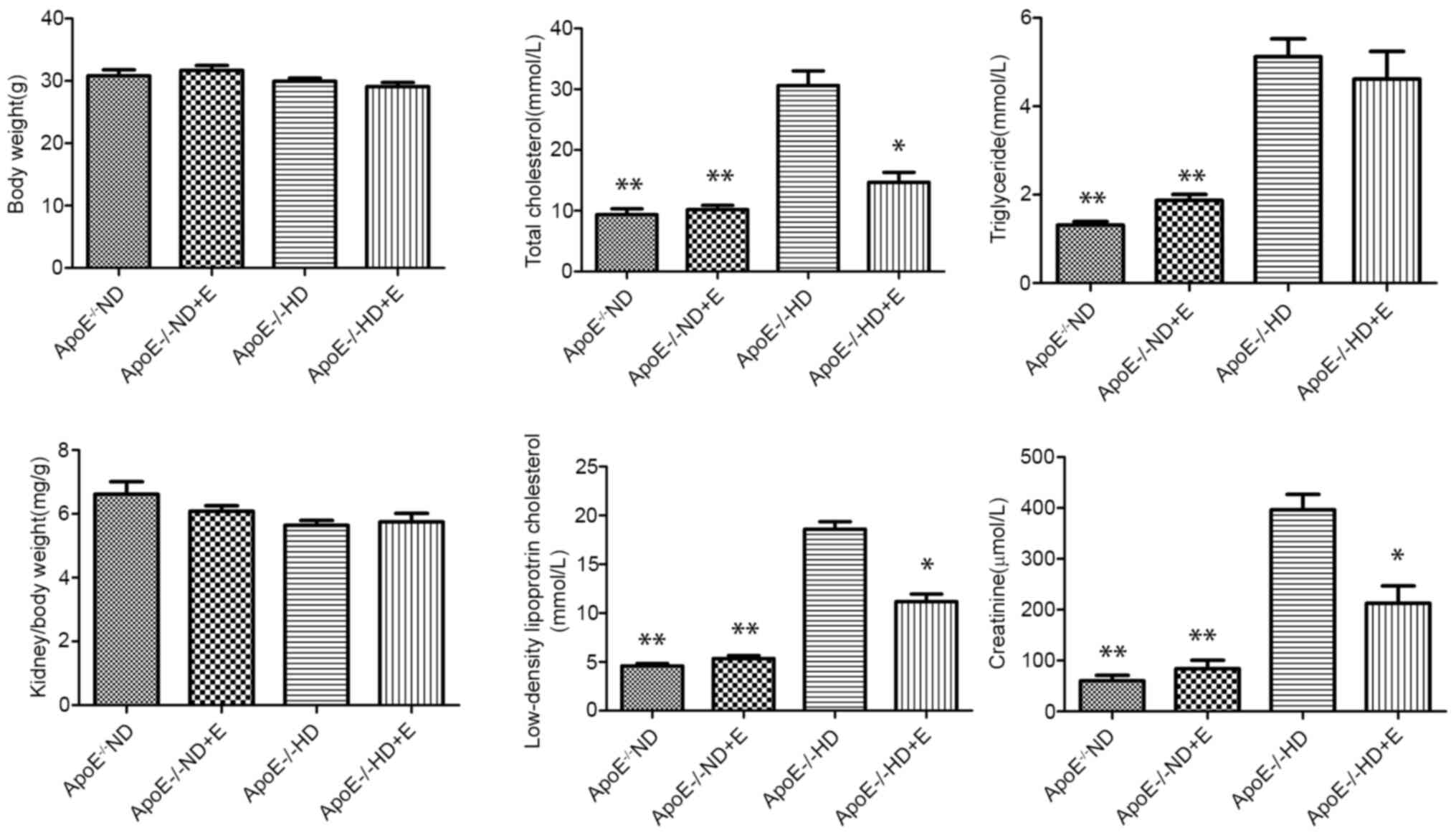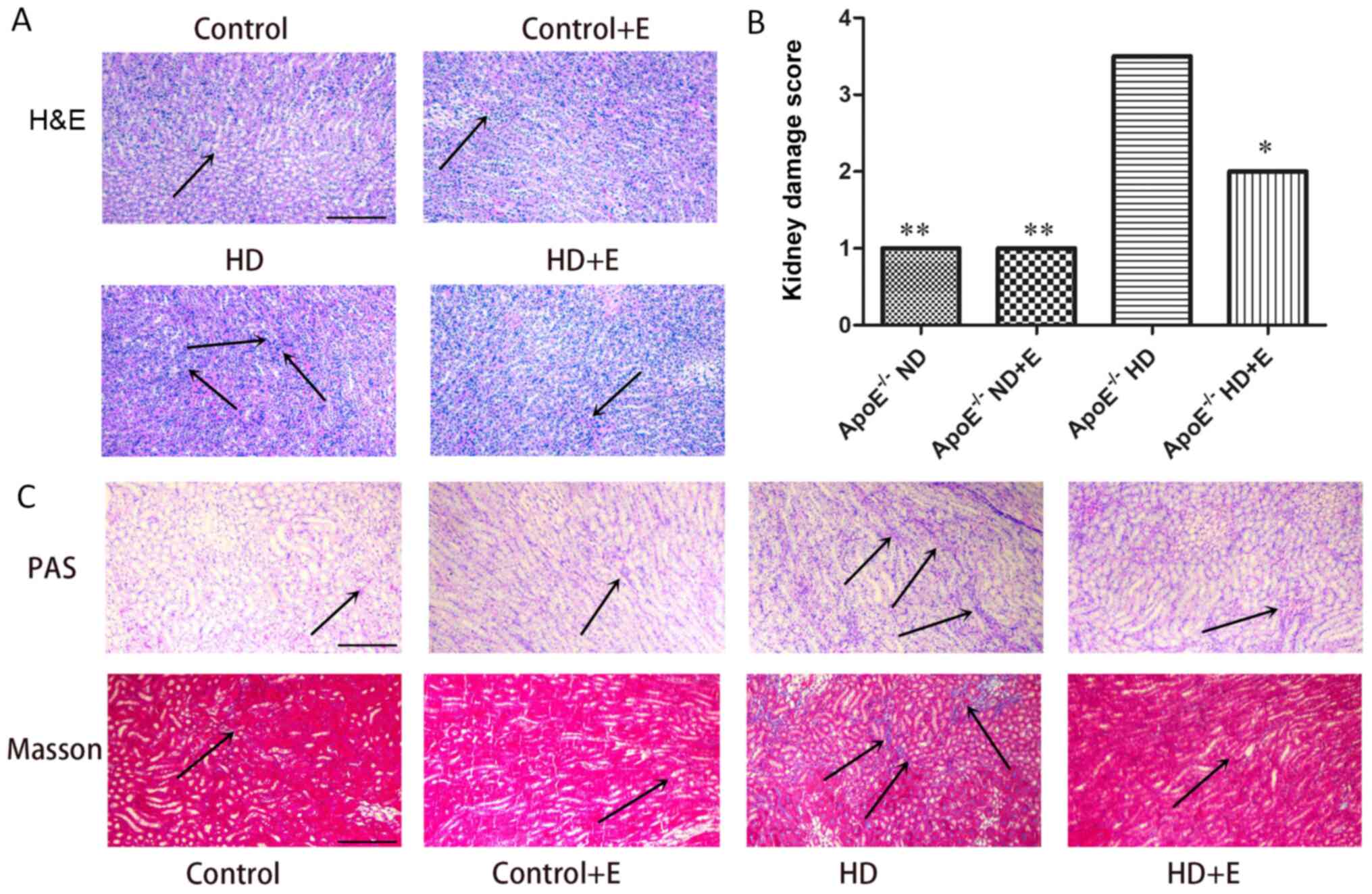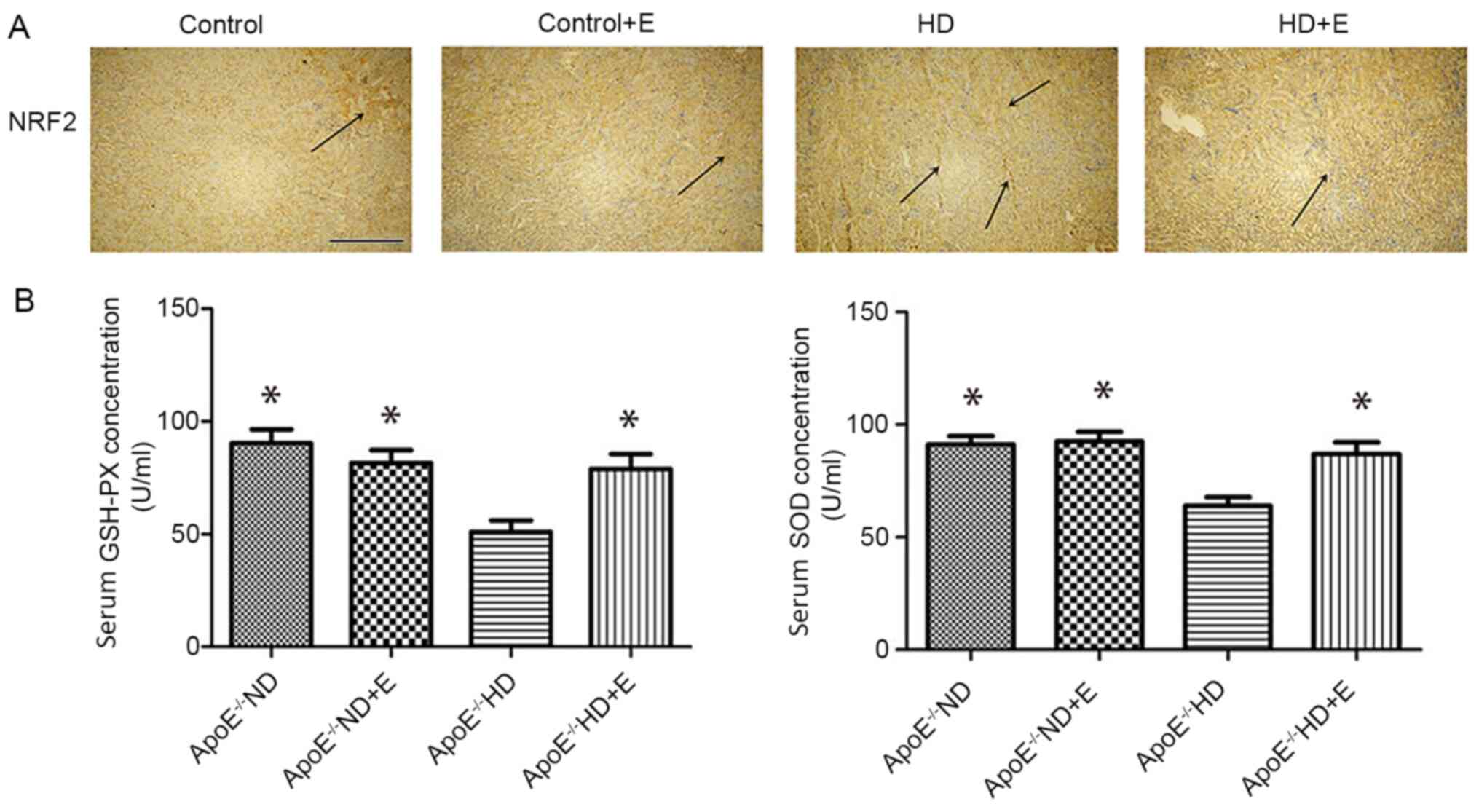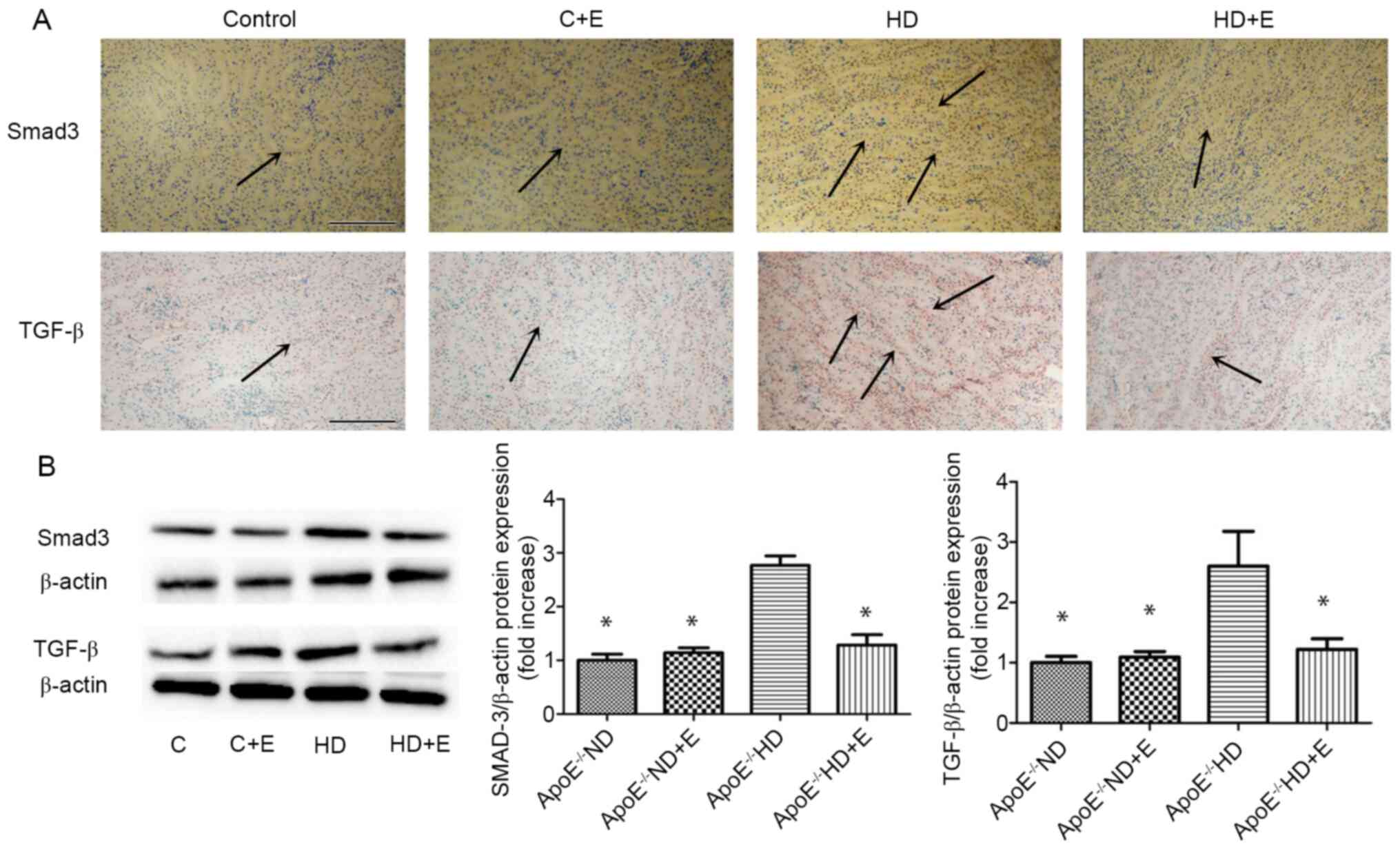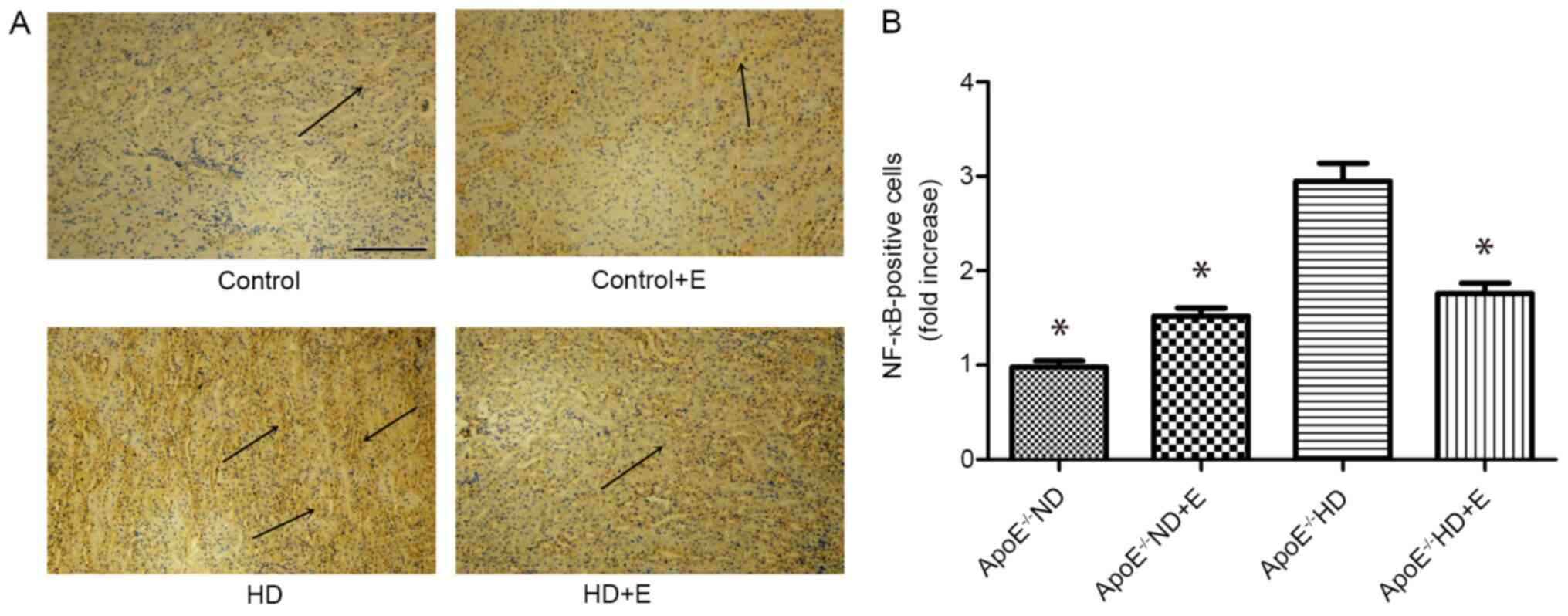|
1
|
Ding M, Si D, Zhang W, Feng Z, He M and
Yang P: Red yeast rice repairs kidney damage and reduces
inflammatory transcription factors in rat models of hyperlipidemia.
Exp Ther Med. 8:1737–1744. 2014.PubMed/NCBI View Article : Google Scholar
|
|
2
|
Peev V, Nayer A and Contreras G:
Dyslipidemia, malnutrition, inflammation, cardiovascular disease
and mortality in chronic kidney disease. Curr Opin Lipidol.
25:54–60. 2014.PubMed/NCBI View Article : Google Scholar
|
|
3
|
Ruan XZ, Varghese Z and Moorhead JF: An
update on the lipid nephrotoxicity hypothesis. Nat Rev Nephrol.
5:713–721. 2009.PubMed/NCBI View Article : Google Scholar
|
|
4
|
Pei Z, Zhu L, Liu Y, Li N, Yang G and Liu
H: Thymoquinone reduces kidney damage in apolipoprotein E-deficient
mice fed a high-cholesterol diet. RSC Advances. 83:53002–53009.
2017.
|
|
5
|
Pei Z, Okura T, Nagao T, Enomoto D, Kukida
M, Tanino A, Miyoshi K, Kurata M and Higaki J: Osteopontin
deficiency reduces kidney damage from hypercholesterolemia in
Apolipoprotein E-deficient mice. Sci Rep. 6(28882)2016.PubMed/NCBI View Article : Google Scholar
|
|
6
|
Zeynali F, Nematbakhsh M, Mojtahedi H,
Poorshahnazari A, Talebi A, Pezeshki Z, Mazaheri S and Moslemi F:
Protective role of aerobic exercise against cisplatin-induced
nephrotoxicity in rats. Asian J Sports Med.
6(e24901)2015.PubMed/NCBI View Article : Google Scholar
|
|
7
|
Cao G, González J, Müller A, Ottaviano G,
Ambrosio G, Toblli JE and Milei J: Beneficial effect of moderate
exercise in kidney of rat after chronic consumption of cola drinks.
PLoS One. 11(e0152461)2016.PubMed/NCBI View Article : Google Scholar
|
|
8
|
Braun K, Atmanspacher F, Schreckenberg R,
Grgic I and Schlüter KD: Effect of free running wheel exercise on
renal expression of parathyroid hormone receptor type 1 in
spontaneously hypertensive rats. Physiol Rep.
6(e13842)2018.PubMed/NCBI View Article : Google Scholar
|
|
9
|
Piedrahita JA, Zhang SH, Hagaman JR,
Oliver PM and Maeda N: Generation of mice carrying a mutant
apolipoprotein E gene inactivated by gene targeting in embryonic
stem cells. Proc Natl Acad Sci USA. 89:4471–4475. 1992.PubMed/NCBI View Article : Google Scholar
|
|
10
|
Sastre C, Rubio-Navarro A, Buendía I,
Gómez-Guerrero C, Blanco J, Mas S, Egido J, Blanco-Colio LM, Ortiz
A and Moreno JA: Hyperlipidemia-associated renal damage decreases
Klotho expression in kidneys from ApoE knockout mice. PLoS One.
8(e83713)2013.PubMed/NCBI View Article : Google Scholar
|
|
11
|
Muñoz-García B, Moreno JA, López-Franco O,
Sanz AB, Martín-Ventura JL, Blanco J, Jakubowski A, Burkly LC,
Ortiz A, Egido J, et al: Tumor necrosis factor-like weak inducer of
apoptosis (TWEAK) enhances vascular and renal damage induced by
hyperlipidemic diet in ApoE-knockout mice. Arterioscler Thromb Vasc
Biol. 29:2061–2068. 2009.PubMed/NCBI View Article : Google Scholar
|
|
12
|
Xu J, Zhu L, Liu H, Li M, Liu Y, Yang F
and Pei Z: Thymoquinone reduces cardiac damage caused by
hypercholesterolemia in apolipoprotein E-deficient mice. Lipids
Health Dis. 17(173)2018.PubMed/NCBI View Article : Google Scholar
|
|
13
|
Hong X, Zhao X, Wang G, Zhang Z, Pei H and
Liu Z: Luteolin treatment protects against renal ischemia
reperfusion injury in rats. Mediators Inflamm.
2017(9783893)2017.PubMed/NCBI View Article : Google Scholar
|
|
14
|
Shingu C, Koga H, Hagiwara S, Matsumoto S,
Goto K, Yokoi I and Noguchi T: Hydrogen-rich saline solution
attenuates renal ischemia-reperfusion injury. J Anesth. 24:569–574.
2010.PubMed/NCBI View Article : Google Scholar
|
|
15
|
Rasband WS: ImageJ, U.S. National
Institutes of Health, Bethesda, MD, 1997-2018.
|
|
16
|
Faran SA, Asghar S, Khalid SH, Khan IU,
Asif M, Khalid I, Gohar UF and Hussain T: Hepatoprotective and
renoprotective properties of lovastatin-loaded ginger and garlic
oil nanoemulsomes: Insights into serum biological parameters.
Medicina (Kaunas). 55(579)2019.PubMed/NCBI View Article : Google Scholar
|
|
17
|
Schaeffner ES, Kurth T, Curhan GC, Glynn
RJ, Rexrode KM, Baigent C, Buring JE and Gaziano JM: Cholesterol
and the risk of renal dysfunction in apparently healthy men. J Am
Soc Nephrol. 14:2084–2091. 2003.PubMed/NCBI
|
|
18
|
Himmelfarb J and Hakim RM: Oxidative
stress in uremia. Curr Opin Nephrol Hypertens. 12:593–598.
2003.PubMed/NCBI View Article : Google Scholar
|
|
19
|
Vaziri ND: Roles of oxidative stress and
antioxidant therapy in chronic kidney disease and hypertension.
Curr Opin Nephrol Hypertens. 13:93–99. 2004.PubMed/NCBI View Article : Google Scholar
|
|
20
|
Blokhina O, Virolainen E and Fagerstedt
KV: Antioxidants, oxidative damage and oxygen deprivation stress: A
review. Ann Bot. 91:179–194. 2003.PubMed/NCBI View Article : Google Scholar
|
|
21
|
Deepa PR and Varalakshmi P: Favourable
modulation of the inflammatory changes in hypercholesterolemic
atherogenesis by a low-molecular-weight heparin derivative. Int J
Cardiol. 106:338–347. 2006.PubMed/NCBI View Article : Google Scholar
|
|
22
|
Scheuer H, Gwinner W, Hohbach J, Gröne EF,
Brandes RP, Malle E, Olbricht CJ, Walli AK and Gröne HJ: Oxidant
stress in hyperlipidemia-induced renal damage. Am J Physiol Renal
Physiol. 278:F63–F74. 2000.PubMed/NCBI View Article : Google Scholar
|
|
23
|
Napoli C and Lerman LO: Involvement of
oxidation-sensitive mechanisms in the cardiovascular effects of
hypercholesterolemia. Mayo Clin Proc. 76:619–631. 2001.PubMed/NCBI View
Article : Google Scholar
|
|
24
|
Kaplowitz N: Mechanisms of liver cell
injury. J Hepatol. 32 (Suppl 1):39–47. 2000.PubMed/NCBI View Article : Google Scholar
|
|
25
|
Loboda A, Damulewicz M, Pyza E, Jozkowicz
A and Dulak J: Role of Nrf2/HO-1 system in development, oxidative
stress response and diseases: An evolutionarily conserved
mechanism. Cell Mol Life Sci. 73:3221–3247. 2016.PubMed/NCBI View Article : Google Scholar
|
|
26
|
Periyasamy P and Shinohara T: Age-related
cataracts: Role of unfolded protein response, Ca2+
mobilization, epigenetic DNA modifications, and loss of Nrf2/Keap1
dependent cytoprotection. Prog Retin Eye Res. 60:1–19.
2017.PubMed/NCBI View Article : Google Scholar
|
|
27
|
Calkins MJ, Johnson DA, Townsend JA,
Vargas MR, Dowell JA, Williamson TP, Kraft AD, Lee JM, Li J and
Johnson JA: The Nrf2/ARE pathway as a potential therapeutic target
in neurodegenerative disease. Antioxid Redox Signal. 11:497–508.
2009.PubMed/NCBI View Article : Google Scholar
|
|
28
|
Petri S, Körner S and Kiaei M: Nrf2/ARE
signaling pathway: Key mediator in oxidative stress and potential
therapeutic target in ALS. Neurol Res Int.
2012(878030)2012.PubMed/NCBI View Article : Google Scholar
|
|
29
|
Ishikawa Y, Gohda T, Tanimoto M, Omote K,
Furukawa M, Yamaguchi S, Murakoshi M, Hagiwara S, Horikoshi S,
Funabiki K, et al: Effect of exercise on kidney function, oxidative
stress, and inflammation in type 2 diabetic KK-Ay mice. Exp
Diabetes Res. 2012(702948)2012.PubMed/NCBI View Article : Google Scholar
|
|
30
|
Campanholle G, Ligresti G, Gharib SA and
Duffield JS: Cellular mechanisms of tissue fibrosis. 3. Novel
mechanisms of kidney fibrosis. Am J Physiol Cell Physiol.
304:C591–C603. 2013.PubMed/NCBI View Article : Google Scholar
|
|
31
|
Jeong SI, Kim KJ, Choo YK, Keum KS, Choi
BK and Jung KY: Phytolacca americana inhibits the high
glucose-induced mesangial proliferation via suppressing
extracellular matrix accumulation and TGF-beta production.
Phytomedicine. 11:175–181. 2004.PubMed/NCBI View Article : Google Scholar
|
|
32
|
Meng XM, Nikolic-Paterson DJ and Lan HY:
TGF-β: The master regulator of fibrosis. Nat Rev Nephrol.
12:325–338. 2016.PubMed/NCBI View Article : Google Scholar
|
|
33
|
Domino M, Jasinski T, Kautz E,
Juszczuk-Kubiak E, Ferreira-Dias G, Zabielski R, Sady M and
Gajewski Z: Expression of genes involved in the NF-κB-dependent
pathway of the fibrosis in the mare endometrium. Theriogenology.
147:18–24. 2020.PubMed/NCBI View Article : Google Scholar
|
|
34
|
Luedde T and Schwabe RF: NF-κB in the
liver--linking injury, fibrosis and hepatocellular carcinoma. Nat
Rev Gastroenterol Hepatol. 8:108–118. 2011.PubMed/NCBI View Article : Google Scholar
|
|
35
|
Umezawa K: Possible role of peritoneal
NF-κB in peripheral inflammation and cancer: Lessons from the
inhibitor DHMEQ. Biomed Pharmacother. 65:252–259. 2011.PubMed/NCBI View Article : Google Scholar
|
|
36
|
Lind DS, Hochwald SN, Malaty J, Rekkas S,
Hebig P, Mishra G, Moldawer LL, Copeland EM III and Mackay S:
Nuclear factor-kappa B is upregulated in colorectal cancer.
Surgery. 130:363–369. 2001.PubMed/NCBI View Article : Google Scholar
|
|
37
|
Sosińska P, Baum E, Maćkowiak B,
Staniszewski R, Jasinski T, Umezawa K and Bręborowicz A: Inhibition
of NF-kappaB with Dehydroxymethylepoxyquinomicin modifies the
function of human peritoneal mesothelial cells. Am J Transl Res.
8:5756–5765. 2016.PubMed/NCBI
|
|
38
|
Sun L, Zhang S, Chang Q and Tan J:
Establishment and comparison of different intrauterine adhesion
modelling procedures in rats. Reprod Fertil Dev.
31(1360)2019.PubMed/NCBI View Article : Google Scholar
|
|
39
|
Mann DA and Marra F: Fibrogenic signalling
in hepatic stellate cells. J Hepatol. 52:949–950. 2010.PubMed/NCBI View Article : Google Scholar
|
|
40
|
Zhang C, Kong X, Ning G, Liang Z, Qu T,
Chen F, Cao D, Wang T, Sharma HS and Feng S: All-trans retinoic
acid prevents epidural fibrosis through NF-κB signaling pathway in
post-laminectomy rats. Neuropharmacology. 79:275–281.
2014.PubMed/NCBI View Article : Google Scholar
|















